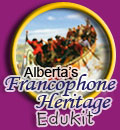 Heritage Community Foundation Presents
Heritage Community Foundation PresentsAlberta Online Encyclopedia
|
|
|
|
|
|
|
|
|
|
||||
 |
|||||
 |
Home>> Culture and Lifeways |
 |
|||
| Culture and Lifeways | |||||
Aspects of the culture of Alberta such as fiddle music and square dancing are a part of the rich cultural traditions of French voyageurs, traders and settlers. As well, they impacted on the landscapes and buildings of their communities through the churches, businesses, schools and other activities that they embarked on. It was not a static community. They came from French regions of Canada but also directly from France and former French colonies in Africa. Most recently, there has been an influx of French-speaking Rwandans driven out by the genocide in 1994. Language and, in many cases, religion are central to the identity of Francophone Albertans but, today, as official language communities, they are conscious of the need to preserve and share their culture and way of life. |
|||||
|
Copyright © 2004 Heritage Community Foundation All Rights Reserved |
|||||
 |
|||||
††††††††††† For more on Francophone Alberta, visit Peelís Prairie Provinces.

